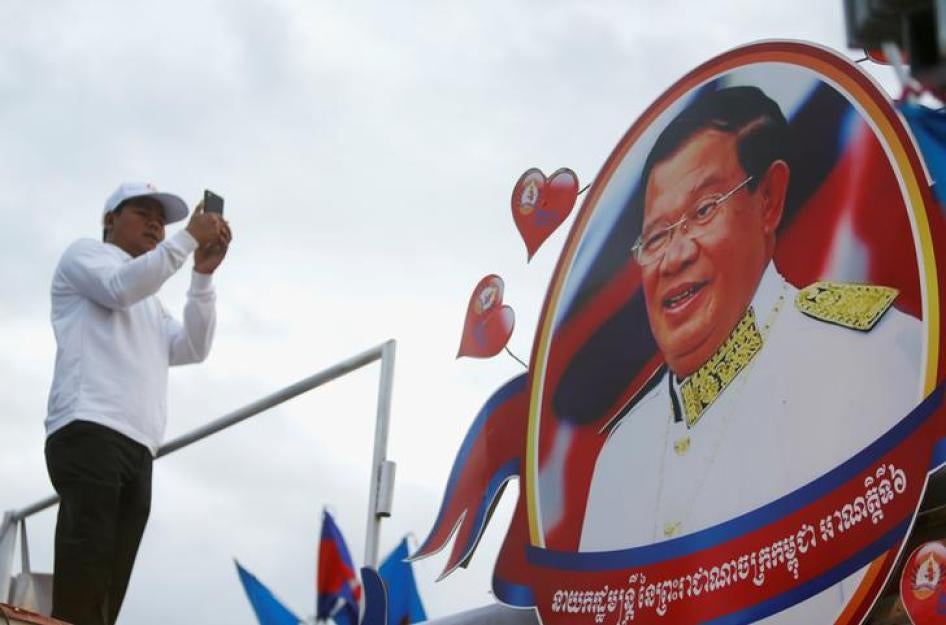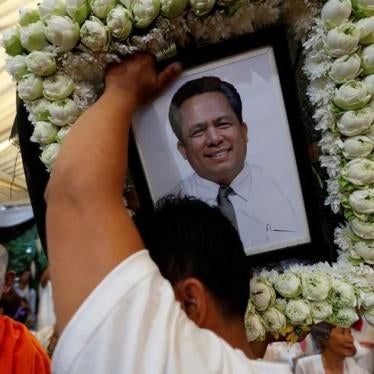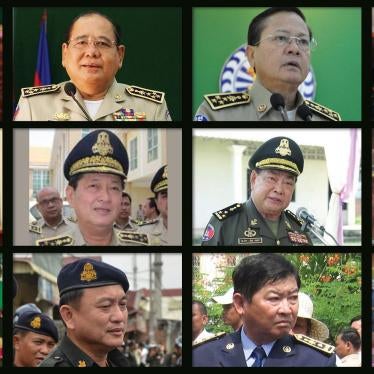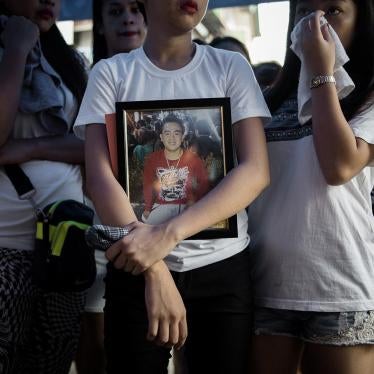(New York) – Cambodian military officers, gendarmes, and police officers are actively campaigning for the ruling Cambodian People’s Party (CPP), in violation of Cambodia’s law requiring political neutrality, Human Rights Watch said today. Cambodia is holding national elections on July 29, 2018, in an environment in which the opposition Cambodia National Rescue Party (CNRP) has been dissolved, its president Kem Sokha has been detained, and its founder Sam Rainsy has been forced into exile.
Senior members of the security forces have endorsed Prime Minister Hun Sen and the CPP at numerous public rallies and other events throughout Cambodia. Article 9 of the Law on the General Status of Military Personnel of the Royal Cambodian Armed Forces (RCAF) states that “military personnel shall be neutral in their functions and work activities, and the use of functions/titles and the state’s materials for any political activities shall be prohibited.”
“To win a sham election, it is not enough for the ruling CPP to ban the opposition, control all election institutions and maintain a chokehold on the media,” said Brad Adams, Asia director. “Apparently the CPP thinks it also needs to deploy some of the country’s most feared generals to campaign and intimidate people into going to the polls.”
According to local media reports, since the official campaign period started on July 7. Gen. Sao Sokha, acting supreme commander of the Cambodian military, campaigned for the CPP, told attendees on July 8 at a Buddhist pagoda in Kandal province that “under the wise leadership of Samdech Techo Hun Sen, Prime Minister of Cambodia, our country has developed everywhere in the country, including roads, bridges, canals, schools, hospitals, etc.”
- Gen. Hing Bun Heang, who was recently sanctioned for human rights violations by the United States under the Global Magnitsky Act, spoke to an estimated 1,000 teachers at a CPP rally on July 8. He spoke to the crowd about the “whole nation's development and peace throughout the country under the wise leadership of Samdech Techo Hun Sen as the head of government and president of the Cambodian People's Party,” and called for those assembled to vote for the CPP.
- Lt. Gen. Rat Sreang, deputy commander of the national gendarmerie and commander of the Phnom Penh gendarmerie, led a CPP team on July 8 in Phnom Penh to “explain to the people how to vote correctly.”
Human Rights Watch has received reports of many other senior members of the security forces campaigning for Hun Sen and the CPP before the official campaign period began on July 7, in violation of Cambodian law:
- Gen. Hun Manet, son of Hun Sen, who was recently promoted to be acting commander in chief of RCAF, campaigned for the CPP on July 2.
- Gen. Meas Sophea, deputy commander in chief of RCAF, inducted CPP members and called for a CPP election victory while campaigning in Preah Vihear province on June 15.
- Chap Pheakdey, deputy army commander and Brigade 911 commander, campaigned for the CPP and Hun Sen in Svay Rieng province on June 17.
- Kun Kim, RCAF deputy supreme commander, campaigned for the CPP in Oddar Meanchey province on June 23 and June 26.
- Pol Saroeun, RCAF supreme commander, made a campaign trip to Preah Sihanouk province and introduced CPP candidates for election, with himself as number one on the list, on June 24 and again on July 1.
- Chuon Sovan, National Police deputy supreme commissioner, presided over CPP campaigning in Pea Reang district of Prey Veng province on June 16.
The list of CPP candidates for seats in the election includes active-duty high-ranking military, gendarmerie, and police officers who have helped maintain Hun Sen’s continued rule since he became prime minister in 1985. These include Pol Saroeun, Meas Sophea, and Kun Kim, along with Lt. Gen. Dy Vichea, deputy chief of the National Police and Hun Sen’s son-in-law.
Guidelines promulgated in 2016 by the Venice Commission and the OSCE Office for Democratic Institutions and Human Rights state that “the non-involvement of judges, prosecutors, police, military, and auditors of political competitors in their official capacity in electoral campaigning is of essential importance. Concrete measures should ensure such official neutrality throughout the entire electoral processes.”
“Basic democratic principles require the political neutrality of the military and police for elections to be free, fair, and credible,” Adams said. “But nothing about this election is democratic, so it is hardly a surprise that the CPP is using senior commanders as ruling party campaigners. Foreign governments that have poured billions of dollars into Cambodia over the past decades to promote democracy should protest this blatant abuse of the electoral process.”









